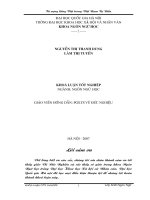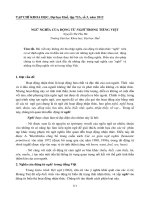Nghiên cứu từ vựng trong tiếng anh5 doc
Bạn đang xem bản rút gọn của tài liệu. Xem và tải ngay bản đầy đủ của tài liệu tại đây (61.52 KB, 11 trang )
rationale/rationalization
RATIONALE/RATIONALIZATION
When you’re explaining the reasoning behind your position, you’re presenting your rationale. But if
you’re just making up some lame excuse to make your position appear better—whether to yourself or
others—you’re engaging in rationalization.
List of errors
file:///C|/Temp/livres/commonerrors/errors/rationale.html03/09/2005 15:39:35
ravaging/ravishing/ravenous
RAVAGING/RAVISHING/RAVENOUS
To ravage is to pillage, sack, or devastate. The only time “ravaging” is properly used is in phrases
like “when the pirates had finished ravaging the town, they turned to ravishing the women.” Which
brings us to “ravish": meaning to rape, or rob violently. A trailer court can be ravaged by a storm
(nothing is stolen, but a lot of damage is done) but not ravished. The crown jewels of Ruritania can be
ravished (stolen using violence) without being ravaged (damaged).
To confuse matters, people began back in the fourteenth century to speak metaphorically of their
souls being “ravished” by intense spiritual or esthetic experiences. Thus we speak of a “ravishing
woman” (the term is rarely applied to men) today not because she literally rapes men who look at her
but because her devastating beauty penetrates their hearts in an almost violent fashion. Despite
contemporary society” s heightened sensitivity about rape, we still remain (perhaps fortunately)
unconscious of many of the transformations of the root meaning in words with positive connotations
such as “rapturous."
Originally, “raven” as a verb was synonymous with “ravish” in the sense of “to steal by force.” One
of its specialized meanings became “devour,” as in “the lion ravened her prey.” By analogy, hungry
people became “ravenous” (as hungry as beasts), and that remains the only common use of the word
today.
If a woman smashes your apartment up, she ravages it. If she looks stunningly beautiful, she is
ravishing. If she eats the whole platter of hors d” oeuvres you’ve set out for the party before the other
guests come, she’s ravenous.
List of errors
file:///C|/Temp/livres/commonerrors/errors/ravaging.html03/09/2005 15:39:36
recreate
RECREATE
REINVENT
The expression “no need to reinvent the wheel” loses much of its wit when “recreate” is substituted for the original verb. While we’re at it, "recreate”
does not mean “to engage in recreation.” If you play basketball, you may be exercising, but you’re not recreating.
List of errors
file:///C|/Temp/livres/commonerrors/errors/recreate.html03/09/2005 15:39:36
real/really
REAL/REALLY
The correct adverbial form is “really” rather than “real”; but even that form is generally confined to
casual speech, as in “When you complimented me on my speech I felt really great!” To say “real
great” instead moves the speaker several steps downscale socially. However “really” is a feeble
qualifier. “Wonderful” is an acceptable substitute for “really great” and you can give a definite
upscale slant to your speech by adopting the British “really quite wonderful.” Usually, however, it is
better to replace the expression altogether with something more precise: “almost seven feet tall” is
better than “really tall.” To strive for intensity by repeating “really” as in “that dessert you made was
really, really good” demonstrates an impoverished vocabulary.
List of errors
file:///C|/Temp/livres/commonerrors/errors/real.html03/09/2005 15:39:43
realtor
REALTOR
For some reason, this word is often mispronounced as “real-a-ter" instead of the proper “ree-ul-ter.”
Incidentally, realtors insist that this is a term originally trademarked by the National Association of
Real Estate Boards (now renamed the “National Association of Realtors” ), that it must be
capitalized, and that all non-members of that association are mere “real estate associates.” Common
usage, however, calls both “real estate agents,” despite their protests.
List of errors
file:///C|/Temp/livres/commonerrors/errors/realtor.html03/09/2005 15:39:44
reason because
REASON BECAUSE
We often hear people say things like, “the reason there’s a hole in the screen door is because I tripped
over the cat on my way out.” The phrase “is because” should be “is that.” If you wanted to use
“because,” the sentence should be phrased, “There’s a hole in the screen door because I tripped over
the cat.” Using both is a redundancy, as is the common expression “the reason why.” “The reason
being is” should be simply “the reason being.”
List of errors
file:///C|/Temp/livres/commonerrors/errors/reason.html03/09/2005 15:39:45
rebelling/revolting
REBELLING/REVOLTING
Even though “rebel” and “revolt” mean more or less the same thing, people who are revolting are
disgusting, not taking up arms against the government.
List of errors
file:///C|/Temp/livres/commonerrors/errors/rebelling.html03/09/2005 15:39:45
rebut/refute
REBUT/REFUTE
When you rebut someone’s argument you argue against it. To refute someone’s argument is to prove
it incorrect. Unless you are certain you have achieved success, use “rebut.”
List of errors
file:///C|/Temp/livres/commonerrors/errors/rebut.html03/09/2005 15:39:45
recent/resent
RECENT/RESENT
There are actually three words to distinguish here. “Recent,” always pronounced with an unvoiced
hissy S and with the accent on the first syllable, means “not long ago,” as in, “ I appreciated your
recent encouragement.” “Resent” has two different meanings with two different pronunciations, both
with the accent on the second syllable. In the most common case, where “resent” means “feel bad
about,” the word is pronounced with a voiced Z sound: “I resent your implication that I gave you the
chocolates only because I was hoping you’d share them with me.” In the less common case, the word
means “to send again,” and is pronounced with an unvoiced hissy S sound: “The e-mail message
bounced, so I resent it.” So say the intended word aloud. If the accent is on the second syllable,
“resent” is the spelling you need.
List of errors
file:///C|/Temp/livres/commonerrors/errors/recent.html03/09/2005 15:39:45
impertinent/irrelevant
REDUNDANCIES
There are many examples of redundancies in these pages: phrases which say twice what needs to be
said only once, like “past history." Advertisers are particularly liable to redundancy in hyping their
offers: “as an added bonus” (as a bonus), “preplan” (plan), and “free gift” (but look out for the
shipping charges!). Two other common redundancies which are clearly errors are “and plus” (plus)
and “end result” (result). But some other redundancies are contained in phrases sanctioned by
tradition: “safe haven,” “hot water heater,” “new beginning,” and “tuna fish."
List of errors
file:///C|/Temp/livres/commonerrors/errors/redundancies.html03/09/2005 15:39:46
reeking havoc
REEKING HAVOC
WREAKING HAVOC
“Reeking” means “smelling strongly,” so that can’t be right. The phrase simply means “working great destruction.” “Havoc” has always referred to
general destruction in English, but one very old phrase incorporating the word was “cry havoc,” which meant to give an army the signal for pillage. To
“play havoc with” means the same thing as to “wreak havoc." Avoid as well the mistaken “wreck havoc."
List of errors
file:///C|/Temp/livres/commonerrors/errors/reeking.html03/09/2005 15:39:46









